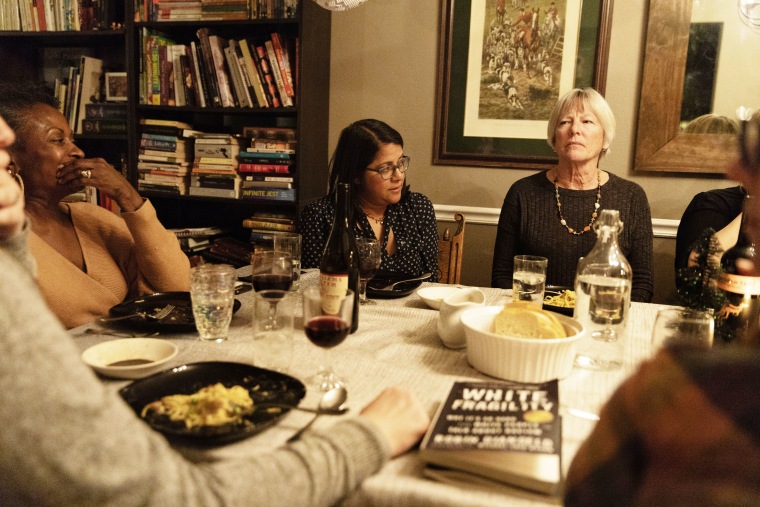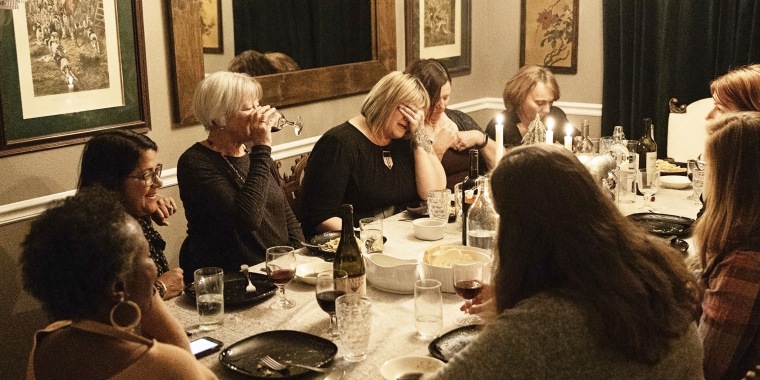Growing up, many people are taught not to talk about politics, religion or race during a meal.
But two women of color believe there's no better place to discuss the pain caused by systemic racism than at the dinner table.
Established in the beginning of 2019, Race 2 Dinner is an organization helmed by Regina Jackson and Saira Rao that orchestrates dinners for eight to 10 guests, all of whom are white women who want to uncover their own racist beliefs and experiences.
What first began as a word-of-mouth experience through Jackson and Rao's Denver community has now expanded to people and corporations across the globe and, due to COVID-19, digitally. During each dinner (or Zoom conference call), Jackson and Rao create a space for participants to openly discuss long-held racist beliefs, opinions and experiences on the table with the ultimate goal of dismantling their complicity in a white patriarchal system.

The idea for Race 2 Dinner was born shortly after Jackson joined Rao's 2018 congressional campaign in Denver. Rao, who is a first generation Indian-American, and Jackson, a Black woman born in the 1950s when Jim Crow laws were still in effect, found that during the campaign, dozens of white women wanted to speak with Rao — over coffee, lunch or at events — to confront her about their lack of racist beliefs.
"I had a white woman friend and she said, 'You know I’m just done with Saira, she’s always against white people this and white people that,'" Jackson, who worked as a management consultant and as a sales executive before retiring in 1998, recalled to TODAY. "She said, 'She really needed to talk to Rao about this race stuff over lunch.'"
In response, Rao told Jackson she'd had enough of the individual meetings, but would meet with the friend over dinner if there could be a whole group of white women present that she could address at once.
What began as an organic gathering confronting racism evolved quickly into a well-oiled business where their team was attending about two dinners a month in the Denver area as well as in cities around the country. At first, dinners were by word-of-mouth only, but now women around the world can sign up through a form on the duo's website. There, women may volunteer to be the host responsible for having the event at their home and providing dinner, or they can sign up as a guest. The form will ask potential diners where they are located, their gender pronouns (she/her, he/his, they/their), their ethnicity and how others categorize the person's race.
While Jackson and Rao welcome any person who identifies as a woman to the dinner table, in-person dinners do not allow male diners to attend in order to provide what the duo consider to be a safer space for women. Both Jackson and Rao told TODAY they have received death threats and been trolled online.
Before attending a dinner or seminar, there is required reading (Robin DAngelo's wildly popular “White Fragility” has been on the list). Though every dinner is unique, Jackson and Rao usually begin the conversation by bringing up a familiar top (like yoga, for example) and address issues that may seem small but have major consequences.
The duo vividly remember a conversation at one of the first dinners in 2019 in Boulder, Colorado. A white yoga instructor was present.
"(The dinner) starts off, Saira says something about yoga and how yoga is cultural appropriation and yoga owners here in the U.S. do not hire black and brown Indian women to teach," Jackson said. "One woman got mad and said, 'You need to take that back!' But the yoga instructor said, 'No, you're right.'"
Conversations are often prompted by or centered around real lived experienced of dinner guests. In that way, one person (in this instance the yoga instructor) is not only able to recognize the ways in which she has been complicit in a system that hurts Black and brown people, but others were made aware of how common these practices can be.
"This is a very interactive thing. We speak very little. Really (we) ask questions and force the white women to confront their own racism," Rao said.
In March, as the coronavirus pandemic began to spread in the U.S., Jackson, Rao and their team switched to Zoom dinner parties (or lunches). Currently, amid the global anti-racism protests sparked by the death of George Floyd in May, Race 2 Dinner has seen a surge in inquiries from the website. They now host digital dinner about two times a week. While food isn't served like it would be at a traditional dinner party, Jackson and Rao say it's the face-to-face connection that matters most.
"The dinners work for a certain reason. Zoom has same effect — everyone's looking at each other as they would in a dinner. This is not a speech or a workshop, this is them talking and us asking," Rao, said. "It’s women who know each other having to talk about their own institutional racism with friends and colleagues."
Jackson and Rao do welcome men for one-on-one digital-only consultations or, if a company wants to do a virtual dinner for its team, the men are divided into one group and the women into another for the group's emotional and mental wellbeing.
However, the significant uptick in interest does not always ensure follow through.
"(White women) will reach out via email and once we follow up, they'll ghost altogether or ghost after hearing the cost," Rao explained. "For many, their 'activism' is hitting send on the email."
Each dinner party initially cost $2,500 total, but that rate increased to $5,000 in February. The funds cover a two-hour dinner, which includes support from Race 2 Dinner's business developer, planning, travel for Jackson and Rao and, when applicable, a post-event consultation. The cost of food was not included in the original dinner party fee.
According to both Rao and Jackson, the conversations can and "must be" raw and uncomfortable.
"An integral part of the work is modeling. Every dinner, when we ask whether anyone is racist, 99.9% of the time no one raises their hand. I always raise my hand. I'm dismantling my own racism," Rao told TODAY. "It's like with women, we are all internally misogynistic because we have learned and always been part of a misogynistic system."
With this type of initiation and accountability acknowledged from the get-go, the dinner table becomes a space where white women can open up about their experiences and thoughts in front of two women of color who force them to confront their beliefs.
"There is no growth without change. And there is no change without pain. It’s gonna be painful," Jackson said.
Dinner parties aren't the only resource Race 2 Dinner provides through its website. Clients can book one-hour consultations with either Jackson or Rao for $300 (or both for $600) in-person, by phone or video chat. Their clientele isn't just in the U.S. as Rao and Jackson have met with people in New Zealand, Australia and the U.K. The duo also run a Patreon account with membership fees that vary from $5 to $250 which grant access to discussion materials to "dismantle white supremacy." There's a new theme each month.
June's theme addressed anti-Blackness and offered written pieces from Jackson, Rao and Lisa Bond (the group's operations manager) on how their perspectives on the topic have been shaped as a black woman, an Indian-American woman and a white woman.
Though Jackson and Rao said that most people who have attended their dinners in the past do actively participate, in the past few weeks, they say they've seen a change in how willing people are not only to address certain topics but express the need for change.
"There does feel like there's a bit of a shift. We're not having to go and push and prod as much. For me, every second or third dinner, a white woman says, 'I feel the weight of the world has been lifted from my shoulders.' White supremacy is toxic for everyone including white people. There's a sense of wanting to talk about it. You can't get anywhere without that," Rao said. "It's happening more readily, I think there is hope for change. We have to be hopeful, otherwise we wouldn't be doing this."
Jackson agreed.
"Black people have always had to be hopeful," she told TODAY. "What's our other option?"


